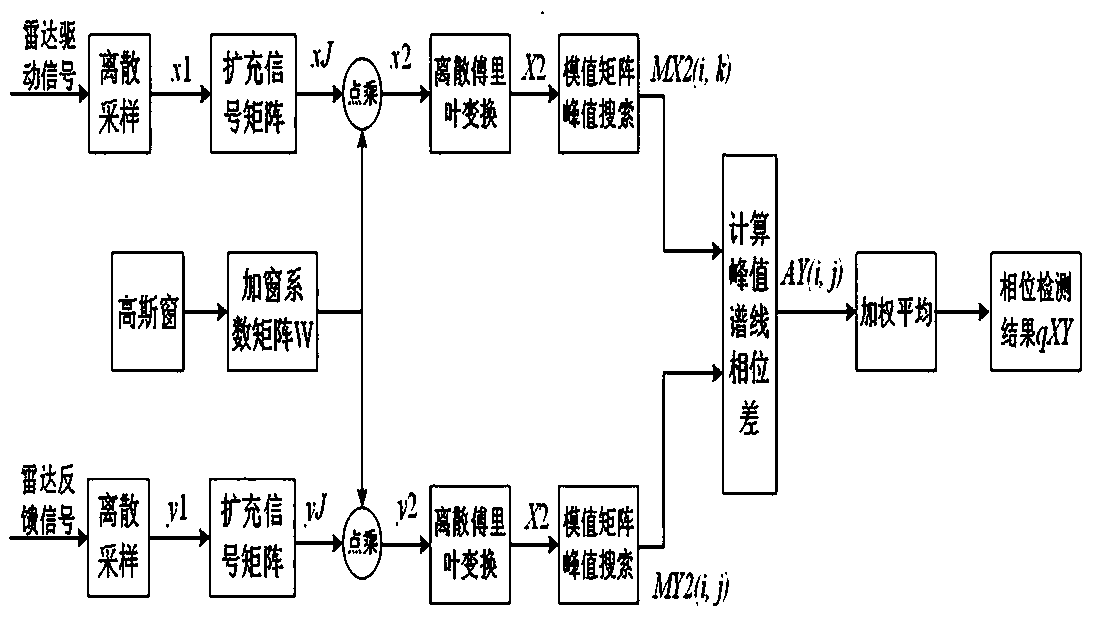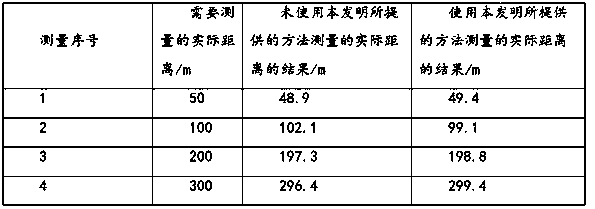Radar signal phase difference detection method aiming at fixed target
A phase difference detection and radar signal technology, applied in the field of signal processing, can solve problems such as difficulty in meeting anti-interference and detection accuracy at the same time, complex environment, uneven measurement channel, etc.
- Summary
- Abstract
- Description
- Claims
- Application Information
AI Technical Summary
Problems solved by technology
Method used
Image
Examples
Embodiment 1
[0028] A radar signal phase difference detection method for a fixed target, the steps are as follows:
[0029] Step 1: The radar driving signal x transmitted by the transmitting antenna and the radar feedback signal y received by the receiving antenna are sent to the analog-to-digital converter, and the radar driving signal x1 and the radar feedback signal y1 of length N after discrete sampling are respectively obtained, where The sampling frequency is fs, and N is an integer power of 2. According to the sampling theorem, the frequency fs should be greater than twice the highest frequency of the radar driving signal;
[0030] Step 2: Use the Gaussian window function to construct a windowing coefficient matrix W, the number of columns of the windowing coefficient matrix W is N, and the number of rows is log2(N), wherein the i-th row of the windowing coefficient matrix W has a length of N, coefficient is σ(i), the i-th row of Gaussian window coefficient σ(i)=i / log2(N), and the e...
Embodiment 2
[0041] On the basis of embodiment 1, the expression of the Gaussian window Gi (t) in the windowing coefficient matrix in the described step 2 is:
[0042] , where t is a time variable, t=0,1,2,3,...,N-1;
Embodiment 3
[0044] On the basis of embodiment 1, the windowing processing method in the said step 3 is to expand the discrete sampling sequence x1 and y1 with a length of N into a matrix with a column number of N and a row number of log2(N), wherein Each row in the matrix is x1 and y1 respectively, and the expanded matrix expressions are:
[0045] and ,
[0046] Then xJ and yJ are respectively dot-multiplied with the windowing coefficient matrix W to obtain the signal matrix x2 and y2 after windowing.
PUM
 Login to View More
Login to View More Abstract
Description
Claims
Application Information
 Login to View More
Login to View More - R&D
- Intellectual Property
- Life Sciences
- Materials
- Tech Scout
- Unparalleled Data Quality
- Higher Quality Content
- 60% Fewer Hallucinations
Browse by: Latest US Patents, China's latest patents, Technical Efficacy Thesaurus, Application Domain, Technology Topic, Popular Technical Reports.
© 2025 PatSnap. All rights reserved.Legal|Privacy policy|Modern Slavery Act Transparency Statement|Sitemap|About US| Contact US: help@patsnap.com


